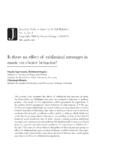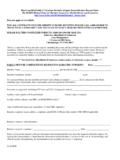Transcription of Copyright 2003 by Reysen Group. 1539-8714 The Effects of ...
1 86 Journal of Articles in Support of the Null Hypothesis. JASNH, 2003, Vol. 2, No. 3. Copyright 2003 by Reysen Group. 1539-8714 . The Effects of gender and ethnicity on the overcontrolled -Hostility Scale of the MMPI-2. Theresa Kay Cheryl Duerksen Patricia Pike Tamara Anderson Weber State University The Effects of gender , ethnicity , and acculturation on the overcontrolled - Hostility Scale (O-H) of the Minnesota Multiphasic Personality Inventory-2. (MMPI-2) among college students were investigated. Initial analyses failed to find significant results, suggesting that the O-H scale may not be sensitive enough to discriminate among individuals in normal populations.
2 Post hoc correlation coefficients between O-H and the basic scales of the MMPI-2 yielded significant positive correlations between O-H and the Lie and Correction scales. Significant negative correlations were found between O-H and the Frequency, Depression, Psychasthenia, Hypomania,Schizophrenia, and Social Introversion scales. These findings are consistent with the theory that high scores on O-H. are related with the tendency to deny distress or pathology. The implications of these findings are discussed. Megargee, Cook, and Mendelsohn (1967) developed the overcontrolled -Hostility (O- H) scale from the Minnesota Multiphasic Personality Inventory (MMPI).
3 According to Levitt (1990), only 3 items were removed from the O-H scale when the Minnesota Multiphasic Personality Inventory-2 (MMPI-2) was developed in 1987, which was not seen to have a significant impact on the integrity of the scale. The O-H scale originally was developed to differentiate between criminals who were characteristically violent versus those who were generally mild mannered, but had rare, sudden, and intense outbursts of violence. The authors provided evidence demonstrating that the O-H scale discriminated successfully between overcontrolled and undercontrolled individuals in both forensic and nonforensic settings.
4 Individuals who produced low scores on O-H possessed scant ability to control hostile impulses, thus exhibiting frequent angry, and possibly violent, behavior. Conversely, people with high O- H scores exerted excessive control on their hostile feelings. Therefore, they generally presented as passive, only to have sudden eruptions of angry or violent behavior. Megargee et al. proposed that such eruptions were likely to be far more intense in overcontrolled individuals due to the longer time span in which hostile feelings accumulate without opportunity for release. Although a considerable body of research has produced interesting findings using the O-H scale in a variety of settings, only a small subset of this research focuses on gender and ethnic differences related to O-H.
5 Some of this literature suggests that the variables of gender and ethnicity may account for some of the variance in O-H scores. Although gender and ethnicity are rarely studied concurrently, a review of this literature leads to hypotheses about their combined role in influencing O-H scores. gender and ethnicity 87. gender and Performance on the overcontrolled -Hostility Scale The majority of the research on the O-H scale involved samples consisting only of male participants. This is suggestive of a considerable lack of research investigating how women perform on the O-H scale, as well as how men and women compare to one another.
6 Sutker, Allain, and Geyer (1978) attempted to address some of this gap in the literature when they studied a sample that consisted entirely of female inmates. They did not find significant differences on O-H when they compared violent offenders and nonviolent offenders. Rathvon and Holmstrom (1996); Walters, Greene, and Solomon (1982); and Walters, Solomon, and Greene (1982) included both men and women in their research samples. Although they found significant differences in O-H when they examined other variables, none of these studies investigated the effect of gender on O-H. scores. A few studies specifically addressing the impact of gender on O-H scores have been conducted, but they have yielded mixed findings.
7 Bigaggio, Godwin, and Baldwin (1984) compared level of compliance among individuals who obtained high scores on O-H, individuals who had been identified as dependent by high scores on the Dependency (Dy) scale of the MMPI, and a control group who were randomly selected from the original sample. The authors found no significant differences in regard to these groups on O-H. They also did not find significant gender differences. Bigaggio and Godwin (1987) investigated the relationship between scores on O-H and Scale 2 on the MMPI. Participants consisted of male and female college students. Analyses revealed no significant relationship between O-H and Scale 2, and no gender differences on O-H scores were found.
8 Paulson, Schwemer, and Bendel (1976) investigated how abusive and nonabusive parents score on the Psychopathic Deviate (Pd), Hypomania (Ma). and O-H scales on the MMPI. Results indicated that neither gender nor whether theparent was abusive had a significant effect on O-H. This group of findings seem to suggest simply that men and women do not differ significantly on this scale. 88 Journal of Articles in Support of the Null Hypothesis. JASNH, 2003, Vol. 2, No. 3. However, other research suggests that significant differences between men and women do in fact exist when examining the construct of the overcontrol of hostility.
9 For example, when Megargee et al. (1967) attempted to cross-validate the O-H scalein a nonforensic population, they found that women had significantly higher scores on O- H than did men, which confirmed the authors' prediction. Heyman (1977) investigated the relationship between O-H scores and instruments measuring dogmatism and aggressiveness. He did not find a significant difference between men and women on O-H specifically. However, the author noted that only men had a significant negative relationship between O-H and dogmatism. The author argued that this finding indicated that men seemed to be better able to integrate aggressiveness into their personality and behaviors, which is consistent with the construct of the overcontrol of hostility.
10 Conversely, Leonard (1977) compared MMPI scores among male and female patients who had committed suicide, highly suicidal patients, and nonsuicidal patients. The participants were matched according to age and sex. The author found that nonsuicidal male patients had significantly higher scores on O-H than any other group. It is difficult to determine what these findings mean. Perhaps the nonsuicidal male patients had not experienced strong enough provocation to express their hostility yet. Another possibility is that the O-H scale was tapping something other than control of hostility in this population. Whatever the case, this study did find significant genderdifferences on O-H.










